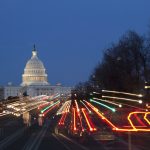Today, 28 law professors, economists, and political scientists from across the nation submitted a letter to Congress expressing serious concerns about the recent push for sweeping changes to patent litigation venue rules, such as those proposed in the VENUE Act. The letter is copied below, and it can be downloaded here: http://ssrn.com/abstract=2816062 Read more
Category: Legislation
Letter on FCC Set-Top Box Regulation Once Again Confuses the Issue
Federal Circuit Brings Some Clarity and Sanity Back to Patent Eligibility Doctrine
By Adam Mossoff and Kevin Madigan
 Following the Supreme Court’s four decisions on patent eligibility for inventions under § 101 of the Patent Act, there has been much disruption and uncertainty in the patent system. The patent bar and most stakeholders in the innovation industries have found the Supreme Court’s decisions in Alice Corp. Read more
Following the Supreme Court’s four decisions on patent eligibility for inventions under § 101 of the Patent Act, there has been much disruption and uncertainty in the patent system. The patent bar and most stakeholders in the innovation industries have found the Supreme Court’s decisions in Alice Corp. Read more
FCC’s Extreme Proposal Threatens the Livelihood of Creators
By Matthew Barblan & Kevin Madigan

Earlier this year, the FCC proposed a new regulatory scheme ostensibly designed to improve the market for pay-TV set-top boxes. Chairman Wheeler claimed that the proposed rules would “tear down the barriers that currently prevent innovators from developing new ways for consumers to access and enjoy their favorite shows and movies on their terms.” Read more
Copyright Policy Should Be Based On Facts, Not Rhetoric
Here’s a brief excerpt of a post by Kevin Madigan & Devlin Hartline that was published on IPWatchdog.
After nearly twenty years with the DMCA, the Copyright Office has launched a new study to examine the impact and effectiveness of this system, and voices on both sides of the debate have filed comments expressing their views. Read more
Separating Fact from Fiction in the Notice and Takedown Debate
By Kevin Madigan & Devlin Hartline
 With the Copyright Office undertaking a new study to evaluate the impact and effectiveness of the Section 512 safe harbor provisions, there’s been much discussion about how well the DMCA’s notice and takedown system is working for copyright owners, service providers, and users. Read more
With the Copyright Office undertaking a new study to evaluate the impact and effectiveness of the Section 512 safe harbor provisions, there’s been much discussion about how well the DMCA’s notice and takedown system is working for copyright owners, service providers, and users. Read more
Acknowledging the Limitations of the FTC’s PAE Study
 The FTC’s long-awaited case study of patent assertion entities (PAEs) is expected to be released this spring. Using its subpoena power under Section 6(b) to gather information from a handful of firms, the study promises us a glimpse at their inner workings. Read more
The FTC’s long-awaited case study of patent assertion entities (PAEs) is expected to be released this spring. Using its subpoena power under Section 6(b) to gather information from a handful of firms, the study promises us a glimpse at their inner workings. Read more
Middle Class Artists Want a DMCA System That Works
The following guest post comes from Rebecca Cusey, a second year law student at George Mason University School of Law.
By Rebecca Cusey
 Mason Law’s Arts & Entertainment Advocacy Clinic filed comments today with the U.S. Copyright Office detailing the frustrations and futilities experienced by everyday artists as they struggle with the DMCA system to protect their copyrights online. Read more
Mason Law’s Arts & Entertainment Advocacy Clinic filed comments today with the U.S. Copyright Office detailing the frustrations and futilities experienced by everyday artists as they struggle with the DMCA system to protect their copyrights online. Read more
Copyright Scholars: Courts Have Disrupted the DMCA’s Careful Balance of Interests
 The U.S. Copyright Office is conducting a study of the safe harbors under Section 512 of the DMCA, and comments are due today. Working with Victor Morales and Danielle Ely from Mason Law’s Arts & Entertainment Advocacy Clinic, we drafted and submitted comments on behalf of several copyright law scholars. Read more
The U.S. Copyright Office is conducting a study of the safe harbors under Section 512 of the DMCA, and comments are due today. Working with Victor Morales and Danielle Ely from Mason Law’s Arts & Entertainment Advocacy Clinic, we drafted and submitted comments on behalf of several copyright law scholars. Read more
Weighing the Patent System
Here’s a brief excerpt of an op-ed by Adam Mossoff that was published in The Washington Times:
As the push for legislation making broad and wide-ranging revisions to the patent system has stalled, its advocates have shifted tactics. They have carved out the provision in H.R. Read more